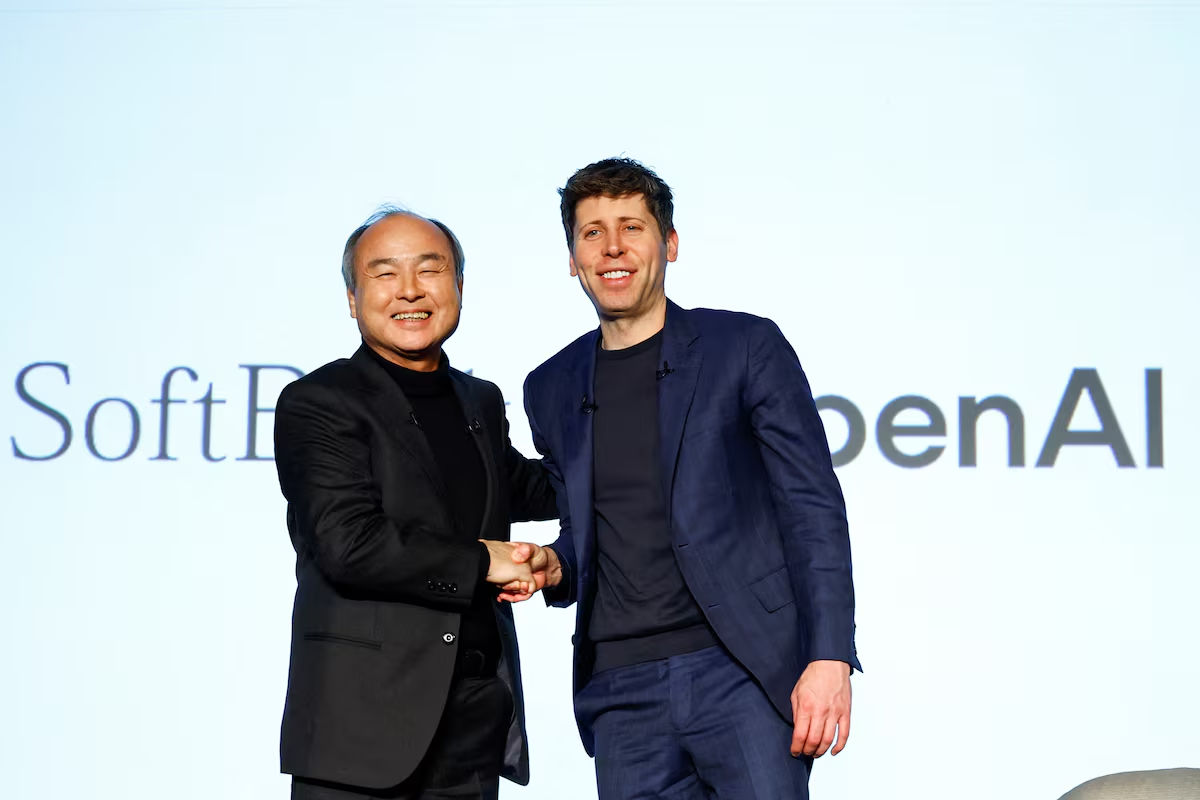Profit at Japan’s SoftBank soars to US$16.6-billion on OpenAI gains

Open this photo in gallery:
SoftBank CEO Masayoshi Son and OpenAI CEO Sam Altman in Tokyo in February. The Japanese tech company plans to invest more in AI even as concerns rise about an ‘AI bubble.’Kim Kyung-Hoon/Reuters
SoftBank Group SFTBY Chief Executive Masayoshi Son’s “all in” bet on OpenAI appears to be paying dividends after the ChatGPT-maker’s valuation soared this year, producing a surge in quarterly profit for the Japanese technology investor.
The results mean more money for SoftBank to employ in its artificial intelligence-related investment spree even as concerns mount of an “AI bubble” in which valuations overestimate the profits the technologies can generate.
SoftBank reported on Tuesday second-quarter net profit more than doubled to 2.5-trillion yen (US$16.6-billion), driven by valuation gains in its OpenAI holdings.
It has also stepped up fundraising activities, selling equity holdings, such as the remainder of its shares in Nvidia for US$5.83-billion, as well as issuing bonds and taking out bridging loans.
SoftBank has been a repeat investor in Nvidia. It sold off its investment before the AI boom took off and then bought the chipmaker’s shares again before divesting in October to double down on its biggest investment bet, OpenAI.
Asked about the timing of the sale of the Nvidia stake, Chief Financial Officer Yoshimitsu Goto said at a press briefing he should not comment, but added that as SoftBank’s investment in OpenAI was very large the company had to use its existing assets to finance new investments.
“Son is a savvy investor so selling the entire stake must mean that he is no longer optimistic about the share price,” said Wong Kok Hoi, founder and chief executive officer of APS Asset Management in Singapore. “Big tech companies may continue to invest heavily in GPU chips but not at this year’s level for many years.”
Softbank’s second quarter earnings coincide with a bull run in technology-related stocks that has sent its share price to record highs. SoftBank announced a four-to-one stock split to make its shares more accessible after they nearly quadrupled in value over the past six months.
Concerns grow about AI bubble
As the wave of investment in artificial intelligence infrastructure such as data centers continues apace and frontrunners in AI development such as OpenAI project rapid growth, SoftBank has been a major beneficiary.
Nevertheless there are growing concerns among investors about an “AI bubble,” where the enormous sums committed to capital investment by leading firms may not generate the high profits to justify the investments.
Losses are mounting at OpenAI, sources told Reuters in October, although its valuation has risen steadily and sharply throughout the year.
“There are various opinions but SoftBank’s position is that the risk of not investing is far greater than the risk of investing,” Goto said at the briefing in Tokyo.
In March, SoftBank agreed to lead a funding round of up to US$40-billion in OpenAI at a valuation of US$300-billion.
In October, a source told Reuters SoftBank was among a consortium of investors acquiring $6.6-billion worth of shares from OpenAI employees at a higher valuation of US$500-billion.
SoftBank’s total investment in OpenAI is expected to reach US$34.7-billion by the end of December this year.
SoftBank’s Vision Fund unit posted an investment gain of 3.5-trillion yen, primarily from the group’s holding in OpenAI which totalled 2.16-trillion yen for the quarter.
The results announced on Tuesday compared with a profit of 1.18-trillion yen in the same period last year, and were SoftBank’s best quarterly result since July-September 2022.
The AI-related investments are SoftBank’s most ambitious since the launch of the Vision Fund vehicles in 2017 and 2019, and demand deep pockets.
Softbank sold its 32.1 million shares of Nvidia, including those held by the asset management subsidiary, in October and also sold part of its stake in T-Mobile for US$9.17-billion.
Since the start of April, it has issued bonds in three currencies worth 620-billion yen, US$2.2-billion and 1.7 billion-euros (US$1.98-billion), respectively.
It also took out a bridging loan of US$8.5-billion for its investment in OpenAI and arranged a US$6.5-billion bridging loan for its acquisition of semiconductor design company Ampere, which it has not yet drawn.
Founder and CEO Masayoshi Son is experienced in making leveraged bets on what he sees as transformative technologies, but his track record is mixed.
While an early bet on Chinese e-commerce site Alibaba proved lucrative, other bets have gone awry, such as shared office provider WeWork.



